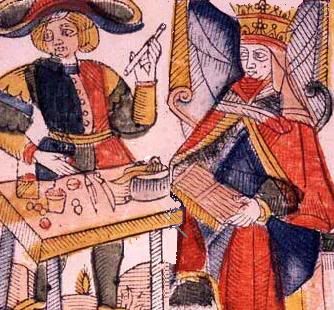Ross G. R. Caldwell wrote:
There is a bit of ribaldry in that sentiment, that is also expressed in a text from around 1450 containing the "Mystery of Saint Bernard de Menthon".
At lines 1869-70, the Fool says -
"If I were the pope of Rome,
My Mariocte would be popess".
(Si j'estoy le pape de Romme,
Ma Mariocte seroit papesse)
We have a hangman,
Pandu soient tous les larrons
Et estachié a ung gibeth. 1860
(St. Bernard put to flight the thieves and brigands that terrrorised the pilgrims way over the alpine pass)
Demain on perdra le caquet ;
Il en aura de baratel.
What is a baratel – (I recall the bagatelle being called something like a 'baraton', idle chatterer or something like)
We have a pope and popesses:
Se festoi [le] pape de Romme,
Ma Mariocte seroit papesse. 1870
Men and women of high rank:
Seignieur et dames de hault pris, 1875
St. Bernard destroys the idols of Jupiter (a connection with XVI as destruction of idols? and XVI as number of Jupiter)
Fust de servir Nostre Seignieur,
Et comment il destruit Terreurs
Des ydoles de Jupiter
and god's horn / trumpet?
Cornent Dieu traïnna enfert, 1890
l'estolle begnoite liez,
Le dyable plus fort atachiez ;
And a hospice (St. Bernard builds a hospice on the foundations of the temple of Jupiter, whose idols he has destroyed) after a devil (another term for hospice was maisondiev-XVI) and the world:
l'estolle begnoite liez,
Le diable plus fort atachiez ;
Puis fonda le noble hospital
De Mont Jou : au monde n'a tal
Plus neccessaire, ne mieulx faisant
A riche ne a pouvre passant.
Entende bien la saincte vie,
Et faictes pais, je le vous prie.
marco wrote:I thought that the Steele Sermon comment about the Popess ("O wretches! That which the Christian Faith denies.") could refer to a female Pope (as in Boccace) or to the "wife" of a Pope, as in
Imperiali's reply:
Poi viene il Papa,con l’Imperatore,
Et ciascun d’essi hà la sua donn’ à canto,
Che senza donne star,lor non da il core.
Then the Pope and the Emperor come,
each with his woman at his side because
their hearts forbid to them to be without women.
I agree, woman as clergy or marriage of clergy are both denied by the faith, and either/both could be referred too.


